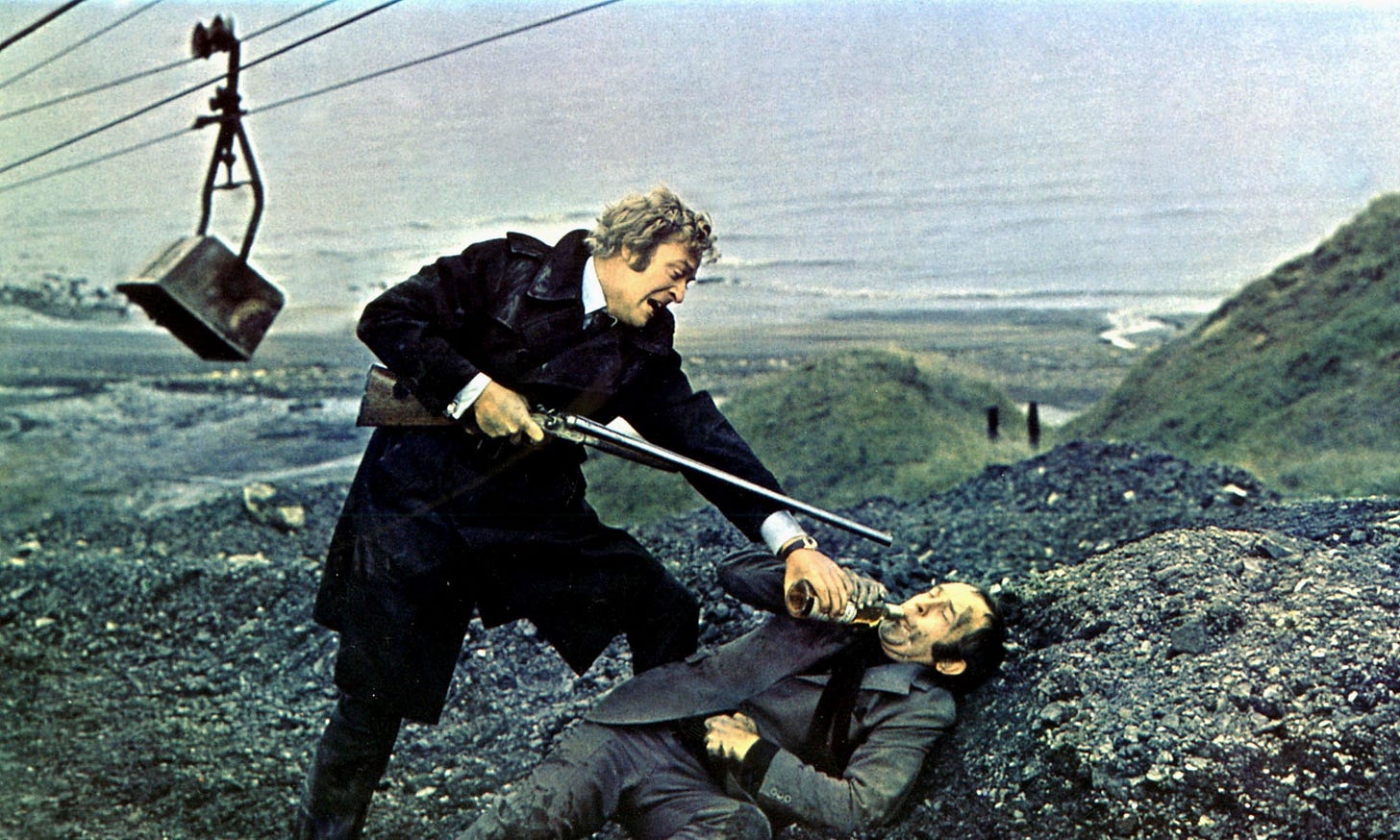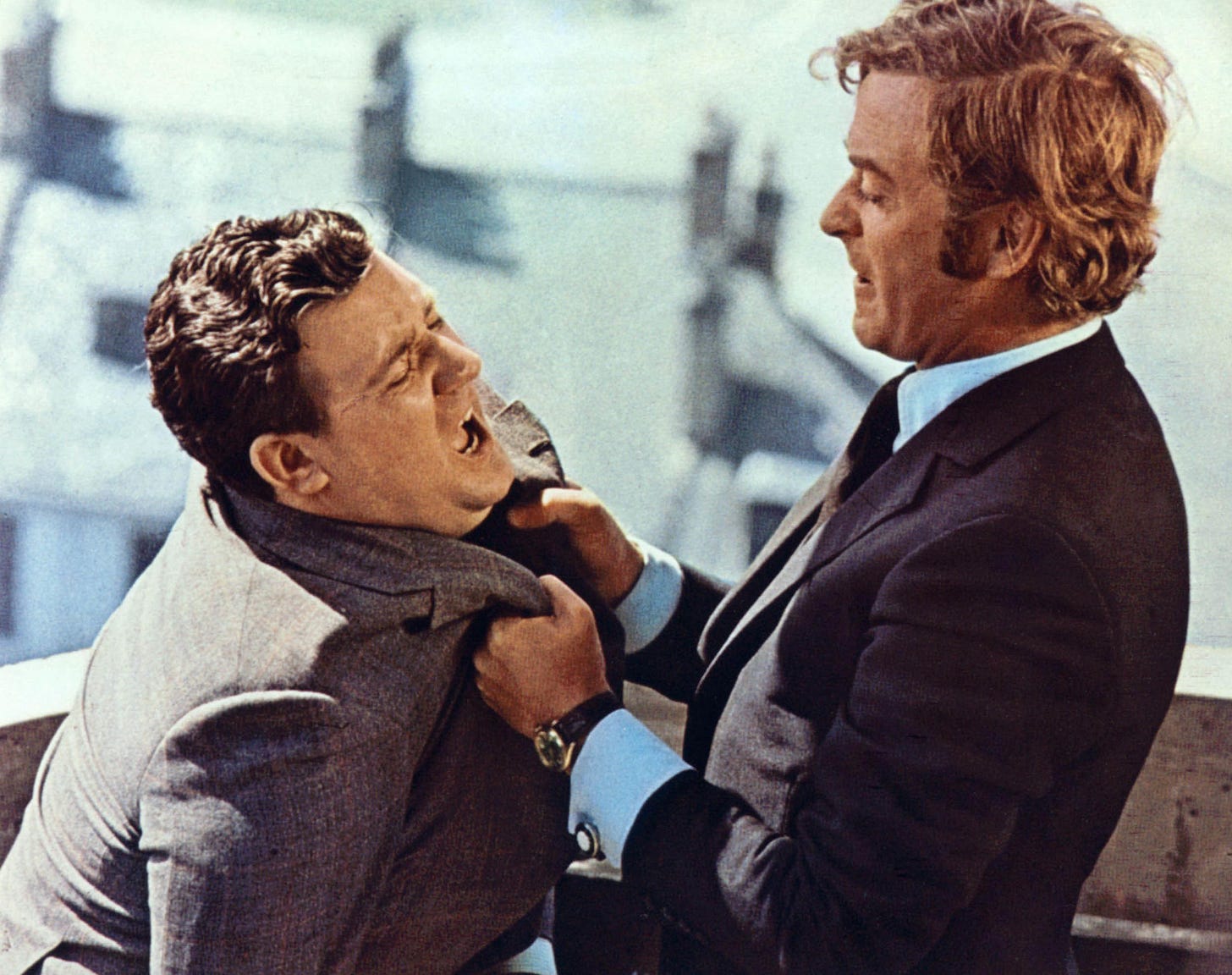Spoilers for Get Carter (1971). Trigger warnings for discussion of sexual assault.
In his introduction to the BFI Blu-ray release of Get Carter, Michael Caine explained that the film was revolutionary in its depiction of UK gangsters. Jack Carter (Caine) is not a loveable rogue, or some dim-witted thug; his moral compass is malleable; his reactions are dependent on whether he has been impacted and his response can be sudden and violent.
It's the dichotomy of gangster films that we are expected to root for a killer, while also demonising the antagonists of the picture. Looking at the characters objectively, Carter is no better than the ‘villains’ he’s fighting against but writer/director Mike Hodges makes no excuses for this.
Carter leaves London and heads to Newcastle-upon-Tyne to investigate his brother’s suspicious death. As he works his way through various characters controlling the underground in the north east, we find out more about Carter. For starters, it’s insinuated that he is actually the father of his niece, Doreen (Petra Markham), which was the reason that the relationship between the brother’s was strained.
Quickly, this depicts Carter as a particularly selfish character. For much of the film, his own needs take priority. If we are to explore Carter’s morality, his treatment of women is the best place to start. At the beginning of the film, we see Carter at a meeting with his cohorts. As they discuss business – primarily whether Carter should go up north or not – a stag film plays in the background. Carter shows no strong reaction to the film.
This opening scene also establishes a relationship between Carter and Anna (Britt Eckland), the girlfriend of Carter’s boss Gerald Feltcher (Terence Rigby). Carter plans to runaway with Anna, leaving his gangland past behind, yet he’s regularly unfaithful and you suspect that this relationship is simply a way for Carter to exert a small amount of power over his boss.
Even their most intimate moment (the now famous phone sex scene) is used by Carter to start a seduction of his northern landlady.
His attitude to women and sex is entirely about his own needs, and yet it is sex that presents a crack in the hardman persona. Having started an affair with Glenda, a partner of crime boss Cyril Kinnear, Carter discovers a film reel in her apartment. When he watches it, he realises that Doreen was forced to take part in a porn film. This discovery ties the film together, explaining why Carter’s brother was killed, and why previously friendly characters have been cagey around him.
But it’s Caine’s performance that really sells the scene. As he watches the reel, he sits in bed shocked. Nothing is said but you can see the emotions across his face, switching from genuine upset to fury. It’s the catalyst to the escalating violence that drives Get Carter towards its conclusion.
Yet Carter is not concerned with rescuing young women in general. His fury comes from his familial connection to Doreen. He has shown no such qualms about the young women in the porn film at the beginning, or the several women he has slept with during. Nor does he have any interest into stepping into a parental role for Doreen. His motivations remain inherently selfish. Carter sees the assault on Doreen as a personal attack on his family – it is the principle, rather than the act that he wishes to avenge.
Hodges himself would say that he wanted to present Carter’s actions as morally bankrupt and futile, and that he saw the character as no more justified than those he kills. You could argue that like in Shane Meadows’ Dead Man Shoes, Carter’s actions are driven by his own failings, but Hodges includes none of the self-reflection that distinguishes Paddy Considine’s performance.
DEAD MAN’S SHOES
Spoilers for Dead Man’s Shoes (2004). Trigger warnings for discussion of suicide, discrimination and disabilities. The 2004 revenge thriller Dead Man’s Shoes eschews the typical formula and instead focuses on the human impact that vengeance tak…
Carter is a particularly cold character. Through his performance, Caine cut out pleasantries that were present in the script to bring him more in line with the criminal characters the actor had seen growing up. Women aren’t the only ones who feel the harshness of this; when Keith (Alun Armstrong) is beaten up for trying to help Carter, Carter has little sympathy.
It gives credence to the fact that his final flurry of revenge attacks is less to do with what happened to Doreen, and more a result of the personal slight Carter feels. Yet in that moment, when he sees Doreen in the film, you could be forgiven for thinking there was genuine concern on Caine’s face. That hardman exterior breaks as tears well in his eyes. Caine would call Carter:
"Carter is the dead-end product of my own environment, my childhood; I know him well. He is the ghost of Michael Caine"
This suggests that had things gone differently, Caine himself could have ended up as a low level thug in London’s gangland. Similarly, for a moment, it seems that Carter reflects on how his life could have been different. On the choices that led to him sat on a strange bed, watching his niece being assaulted.
But Carter is nothing but practical. You cannot change the past. You cannot change who you are. And this momentary lapse in selfishness is quickly overridden. He does not avenge his brother or niece, instead he takes revenge for himself.
Writer/director: Mike Hodges
Starring: Michael Caine, Ian Hendry, Britt Ekland, Bryan Mosley










